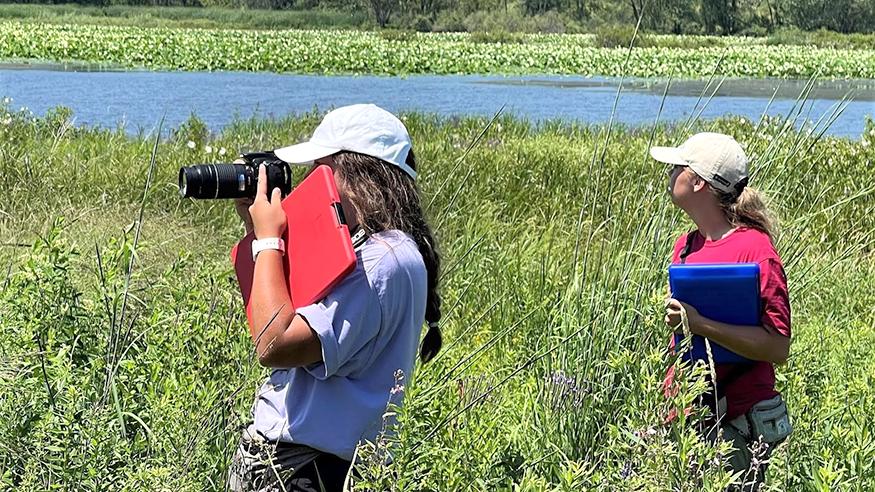
Intern Paige Lundborg '23, left, photographs bees in Nahant Marsh.
Academic opportunities in the lab, the marsh and on the beach
Paige Lundborg ’23
How do Augustana students get cool internships? Ask Paige Lundborg ’23, who searched for and studied bees, including the endangered Rusty Patched Bumble Bee, for the Illinois/Iowa U.S. Fish and Wildlife Service last summer.
Lundborg, a biology and environmental studies major from Batavia, Ill., learned about the internship in an Augustana January term class as a junior. She researched the opportunity; obtained recommendations from Augustana professors Dr. Kevin Geedey and Dr. Jason Koontz; and applied, being sure to note her previous fieldwork experience with Augustana’s Upper Mississippi Center.
Not a simple process, but it yielded a résumé-building experience. Some days were long and challenging, Lundborg admits, but she enjoyed being outdoors, documenting different bees in nearby Nahant Marsh and presenting her data to the U.S. Fish and Wildlife Service. For the record, Lundborg and her team found 80-plus Rusty Patched Bumble Bees at the sites they studied.
Bobby Nwachukwu ’23
Working in the lab last summer with his biochemistry advisor/professor Dr. Pamela Trotter gave Bobby Nwachukwu ’23 an edge.
Under Dr. Trotter’s direction, he researched different conditions that can affect the ability of the yeast Yarrowia lipolytica to produce lipids, which gives it potential to become a biofuel.
Nwachukwu says this one-on-one internship — funded by Augie Choice and the endowed Robert W. Beart Chair in Chemistry — improved his critical thinking skills and taught him the “tips and tricks” of working in a research lab, on his own and as part of a team. He will write a paper and present his results for his Senior Inquiry capstone in the spring.
A pre-medicine and biochemistry major from Abuja, Nigeria, Nwachukwu’s post-Augustana goal is to enter a Ph.D. program. Aiming for a career in research, he describes his internship as essential for grad school and one that could make a difference.
Audrey Zettler ’25
Audrey Zettler ’25 spent hours on the beach last summer — at night, waiting for sea turtles to come ashore to nest.
A geology and Spanish major from Jacksonville, Ill., Zettler was in Cuba as part of an American and Cuban research team including her father, Dr. Lawrence Zettler, a biology professor at Illinois College.
For nearly a week, the researchers camped at Guanahacabibes National Park in western Cuba — no cell phone reception, no electricity, no potable water, lots of bugs.
Wearing flashlights with red filters so as not to disturb the turtles coming onshore, Zettler and others worked quietly to measure the sea turtles’ shells, tag the turtles, count eggs as they dropped into the nests, and sometimes help bury the nests.
The experience enabled Zettler to envision her future in terms of possible conservation work, all while practicing her Spanish with native speakers. She would love to return to Cuba and is considering doing a Senior Inquiry capstone that compares rocks in western Cuba to rocks in other parts of the world.
